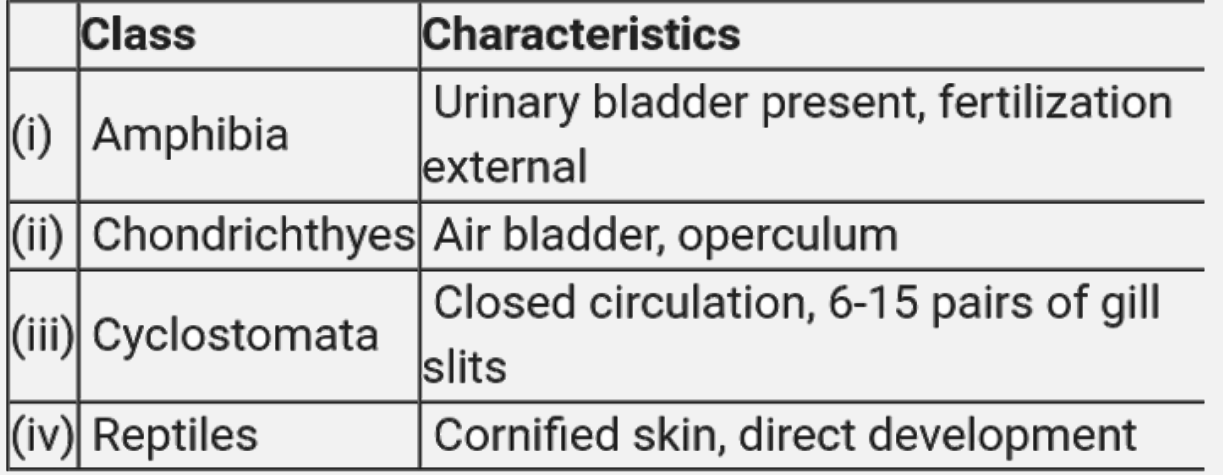Which one of the followig phyla is correctlly matched with its two general characteristics
Chordata Notochord at somestage and separateanal and urinary openings to the outside
Echinodermata Pentameous radialsymmetry and mostlyinternal fertilisation
Mollusca Normally oviparousand developmentthrough a trochophoreor veliger larva
ArthropodaBody divided into head, thorax and respirationby tracheae
The correct Answer is:C
To determine which phylum is correctly matched with its two general characteristics, we will evaluate each option provided:
1. Chordata: The statement claims that chordates do not have a notochord at some stage and that they have separate anal and urinary openings to the outside.
- Evaluation: This is incorrect. Chordates do have a notochord at some stage of their life cycle, and while many have separate anal and urinary openings, it is not universally true for all chordates.
2. Echinodermata: The characteristics mentioned are pentamerous radial symmetry and mostly internal fertilization.
- Evaluation: This is also incorrect. Echinoderms exhibit pentamerous radial symmetry in their adult form, but their larvae typically show bilateral symmetry. Moreover, fertilization in echinoderms is usually external, not internal.
3. Mollusca: The characteristics state that they are normally oviparous and develop through trochophore or veliger larvae.
- Evaluation: This is correct. Mollusks typically reproduce by laying eggs (oviparous), and their larvae can develop through a trochophore or veliger stage.
4. Arthropoda: The statement claims that the body is divided into head, thorax, and respiration by trachea.
- Evaluation: This is partially correct. Arthropods do have a body divided into head, thorax, and abdomen (not thorax and abdomen). Additionally, respiration can occur through various structures, including trachea, gills, or book lungs, making this description incomplete.
Conclusion: The only option that is correctly matched with its characteristics is Option 3: Mollusca.
- Evaluation: This is incorrect. Chordates do have a notochord at some stage of their life cycle, and while many have separate anal and urinary openings, it is not universally true for all chordates.
- Evaluation: This is also incorrect. Echinoderms exhibit pentamerous radial symmetry in their adult form, but their larvae typically show bilateral symmetry. Moreover, fertilization in echinoderms is usually external, not internal.
- Evaluation: This is correct. Mollusks typically reproduce by laying eggs (oviparous), and their larvae can develop through a trochophore or veliger stage.
- Evaluation: This is partially correct. Arthropods do have a body divided into head, thorax, and abdomen (not thorax and abdomen). Additionally, respiration can occur through various structures, including trachea, gills, or book lungs, making this description incomplete.
Topper's Solved these Questions
Similar Questions
Knowledge Check
- Question 1 - Select One
Which one of the following phyla is correctly matched with its two general characteristics?
AEchinodermata- pentamerous radial symmetry and mostly internal fertilisationBMollusca- normally oviparous and development through a trochophore or veliger larvaCArthropoda- body divided into head, thorax and abdomen and respiration by mouthDChordata - notochord persists throughout and separate anal and urinary openings to the outside - Question 2 - Select One
Which of the following classes is incorrectly matched with its general characters ?
ACyclostomata : Lack jaws and paired fins and body is covered with placoid scales.BOsteichthyes : Four pair of gills are covered with an operculum and skin is covered with cycloid scalesCReptilla : Tympanum represents ear and fertilisation is internalDAves : Endoskeleton is fully ossified and long bones are hollow with air cavities called as pneumatic bones.
Which one of the following phyla is correctly matched with its two general characteristics?
(a) Arthropoda : Body divided into head, thorax and abdomen and respiration by tracheae .
(b) Chordata : Notochord at some stage and separate anal and urinary openings to the outsides
(c) Echinodermata : pentamerous radial symmetry and mostly internal fertilization
(d) Mollusca : Normally oviparous an development through as trochophore or veliger larvaView SolutionWhich one of the following classes is incorrectly matched with its two general characters ?
 View Solution
View SolutionWhich one of the following animals is correctly matched with its one characteristic and the taxon?
View SolutionWhich one of the following organisms is correctly matched with its three characteristics
View SolutionWhich one of the following organisms is correctly matched with its three characteristics
View SolutionWhich one is correctly matched with its three characteristics
View Solution

